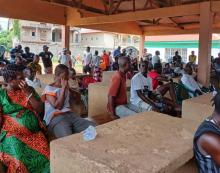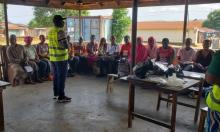Communities in Sierra Leone are ready for the mpox vaccine
Freetown, Sierra Leone - Community engagement is visibly reshaping Sierra Leone’s response to mpox. Since the first confirmed case in January 2025, health workers and mobilisers have been moving steadily through affected areas, bridging information gaps, building trust, and helping people understand how to protect themselves and their families.
Earlier this month, the WHO team joined local authorities on a field mission to observe this work up close. In one rural district, we met Hawa Yayah, a community mobiliser calmly walking from house to house. She spoke with residents in their own language, listened to their concerns, and used familiar examples to explain how mpox spreads and how to stay safe.
Hawa is one of dozens of trained mobilisers deployed across hotspot communities. Her work may seem simple - share accurate health information, answer questions, and encourage basic prevention steps like handwashing, early reporting and avoiding contact with infected persons, but its impact is profound.
“We’ve done the talking. The people listen to us,” she says. “They’ve received the messages. Some of them even play the mpox voice notes from their phones while we’re speaking. They know what to do. Now they’re asking when they’ll get the vaccine.”
The transformation is remarkable. Initial resistance to mpox messages, fueled by fear, stigma, and misinformation has begun to fade. Hawa remembers when people whispered about the disease, believing it to be a curse or punishment. But through repeated visits, honest dialogue, and the involvement of trusted local leaders, perceptions are shifting.
“We don’t shout at them. We explain,” she says. “And when you keep showing up, whether the sun is hot or the roads are bad, they start to believe that you care. That’s when they ask real questions. That’s when they really listen.”
And now, they are ready. In compound after compound, residents say they are following the guidance. They wash their hands more often. They avoid contact when someone is sick. They recognise the symptoms. And increasingly, they ask the same question: What about the vaccine?
“They tell me, ‘We’ve done what you asked. We’ve followed the advice. But when will the vaccine come to us?’”
Since January, WHO has supported Sierra Leone’s Ministry of Health in leading the national mpox response. This support spans surveillance, health worker training, lab testing, and community engagement. WHO has also helped adapt communication materials to local languages and cultural contexts, ensuring messages are not just heard, but understood and accepted.
“Community engagement isn’t a side activity, it is central to the outbreak response,” says Dr George Ameh, WHO Country Representative in Sierra Leone. “People like Hawa are translating science into action. They are trusted. Their work is saving lives.”
On the vaccine front, WHO is working closely with relevant partners and the Ministry of Health to ensure availability of sufficient vaccines. This includes providing technical guidance, assessing cold chain systems, and coordinating efforts to deliver vaccines efficiently to high-risk populations once they arrive.
But for Hawa, it’s also personal. “I promised them the vaccine is coming,” she says softly. “They’ve taken the first step. They’ve trusted us. Now it’s time for the next one.
As she sets off for the next village, carrying her flipbook, her notebook, and a bundle of IEC materials, she pauses for a moment. “Trust is everything,” she says. “And right now, that trust depends on what happens next.”
Emergencies Communications Officer
WHO Africa Regional Office
nwonyec [at] who.int (nwonyec[at]who[dot]int)
+2348034645524
WHO Sierra Leone
Email: sharkahm [at] who.int (sharkahm[at]who[dot]int)


